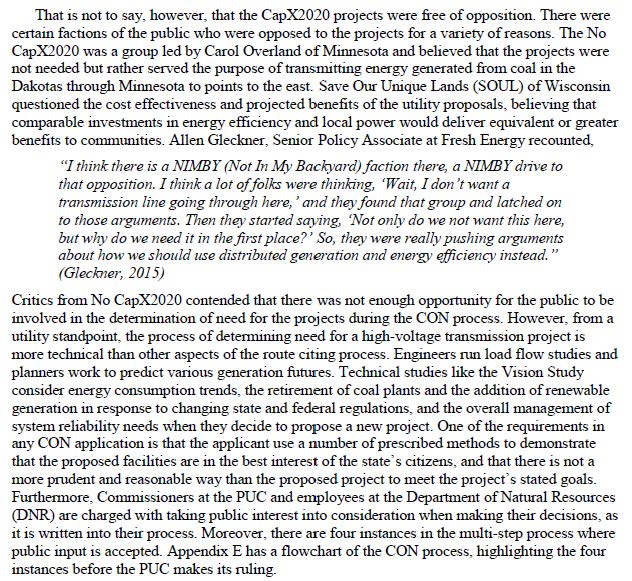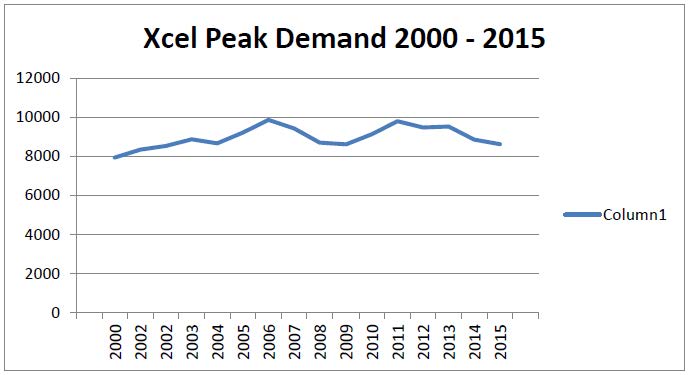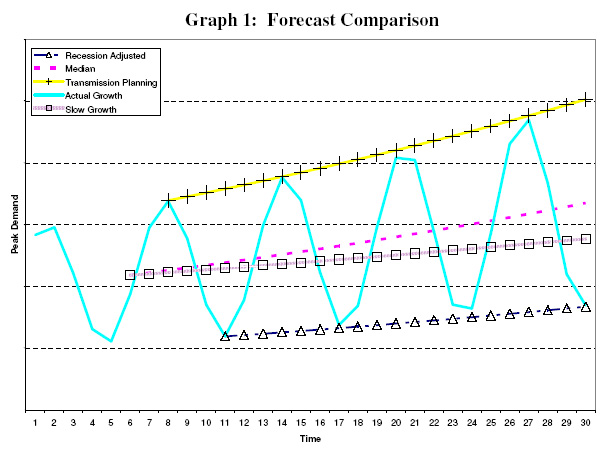Alan Muller on Red Wing’s garbage ash “mining”
April 30th, 2016
U of M Humphrey “report” on CapX 2020
April 28th, 2016

It’s out, the report from U of M Humphrey School of Public Affairs about CapX 2020, headlining it as a “Model for addressing climate change.“
Transmission Planning and CapX 2020: Building Trust to Build Regional Transmission Systems
Oh, please, this is all about coal, and you know it. This is all about enabling marketing of electricity. In fact, Xcel’s Tim Carlsbad testified most honestly that CapX 2020 was not for wind! That’s because electrical energy isn’t ID’d by generation source, as Jimbo Alders also testified, and under FERC, discrimination in generation sources is not allowed, transmission must serve whatever is there. And the report early on, p. 4, notes:
Both North and South Dakota have strong wind resources and North Dakota also has low-BTU lignite
coal resources that it wants to continue to use. New high-voltage transmission lines are needed to
support the Dakotas’ ability to export electricity to neighboring states.See also: ICF-Independent Assessment MISO Benefits
Anyway, here it is, and it’s much like Phyllis Reha’s puff piece promoting CapX 2020 years ago while she was on the Public Utilities Commission, that this is the model other states should use:
MN PUC Commissioner Reha’s Feb 15 2006 presentation promoting CapX 2020
So put on your waders and reading glasses and have at it.
Here’s the word on the 2005 Transmission Omnibus Bill from Hell – Chapter 97 – Revisor of Statutes that gave Xcel and Co. just what they wanted, transmission as a revenue stream:

And note how opposition is addressed, countered by an organization that received how much to promote transmission. This is SO condescending:

… and opposition discounted because it’s so technical, what with load flow studies, energy consumption trends, how could we possibly understand? We couldn’t possibly understand… nevermind that the decreased demand we warned of, and which demonstrated lack of need, was the reality that we were entering in 2008.

And remember Steve Rakow’s chart of demand, entered at the very end of the Certificate of Need hearing when demand was at issue??? In addition to NO identification of axis values, the trend he promoted, and which was adopted by the ALJ and Commission, has NOT happened, and instead Xcel is adjusting to the “new normal” and whining that the grid is only 55% utilized in its e21 and rate case filings. Here’s Steve Rakow’s chart:

Reality peak demand trajectory was lower than Rakow’s “slow growth” line, in fact, it’s the opposite from 2007 to present. Suffice it to say:

Yes, it’s true, Prince died
April 21st, 2016
Governor Dayton orders I-35W Bridge to remain purple all weekend
KMOJ – Listen Up!
Prince was found dead today at Paisley Park. 57 years old. Not surprised, because I just can’t imagine him being old, and that thought popped into my head when I’d heard about that “medical emergency” last week, how he’d age… maybe it’s just my latest milestone birthday, or that his memoir is due out soon, but the idea of a crochety Prince, an oxymoron.
I didn’t know him, just literally “in passing” in the halls of Central H.S., but friends in music did, and, well, that memoir could be interesting…
STrib: ORAL HISTORY: Prince’s life, as told by people who knew him best
Mpls Central? Yearbook photos — from P. Nelson, 2nd column from left, go down one row and over three, and there’s my little bro!
Prince was talented and musically influential beyond measure. He put Minneapolis on the map, and how long was it that he was at top of charts elsewhere, yet metro radio wouldn’t give him air time? Who was it that called Purple Rain the best country western song ever written?
RIP Prince!
And on Barn Bluff, here in Red Wing, before the City “redacted” it:
Criminal Charges Begin re: Flint Water
April 20th, 2016
Yesterday, Alan and I were in Hastings, and we were talking about the extreme pollution of 3M, and of DuPont in Delaware. In Flint, it appears that it’s being taken seriously, though these first three charged may just be the sacrificial offerings:
In Michigan, the dominos are starting to fall. Susan Hedman, former head of EPA Region 5, did the right thing, resigned, and quickly, but since then? Well, now the criminal charges have begun:
Flint water crisis: Criminal charges against three state and city workers
From the article:
I would hope they’ll go deeper and that more will be charged.
It’s different in Minnesota. 3M knew enough to stop manufacturing PFOA, but it was dumped and made its way into our water, there’s a lawsuit initiated by our Minnesota Attorney General, but no criminal charges:
Study finds link between 3M-made chemical and cancer
Lawsuits Charge that 3M Knew About the Dangers of its Chemicals
A few snippets from the above article:
… and (the red links are to EPA testing):
After the initial discovery of PFCs in drinking water near the Cottage Grove plant, 3M installed filtration systems on the water supply for the nearby community of Oakdale, provided bottled water for residents with private wells, and remediated three of its former dump sites. However, the most recent water tests, released by the EPA in January, still showed 25 detections of PFCs in wells that provide drinking water to Woodbury, Oakdale, and Hastings — all of which are near 3M headquarters — as well as in the Cottage Grove water utility, which serves more than 33,000 people.
In two wells in Oakdale, PFOS contamination detected by EPA tests released in January exceeded the provisional health levels set by the agency. And several Oakdale wells had PFOA levels higher than those that qualified residents to participate in a class-action suit against DuPont in West Virginia and Ohio.
The Minnesota Pollution Control Agency has a page on this, where dangers are minimized, and where not much has been posted past 2009 (note landowners with wells have to pay over $300 for testing their water!):
The 3M Cottage Grove Facility and Perfluorochemicals
Why has no one been charged at 3M? Why is this surface and ground water pollution not front and center?
What about the bad water in Pennsylvania from fracking, Dimock, PA comes to mind, and that was public knowledge over 7 years ago:
Gas in wells in Dimock Twp. PA
And remember that National Geographic article with astonishing photos way back in 2007 about the poisoned and dry wells in Wyoming? That was a decade ago. What’s been done?
Drilling in the West – in National Geographic this month
US Supremes Weigh in on Electric Market
April 19th, 2016
Here’s an interesting case (oh, how I hate that word “interesting”). It’s about whether a state can offer “incentives” over and above FERC wholesale electric rates that would incentivize construction of new in-state generation. US SCt says NO! The states can only regulate retail rates.
This is a case regarding Maryland “incentives” and PJM, but it’s applicable to our good friends at MISO too.
So do tell, what does this mean for FERC set rates of recovery and cost allocation for all this transmission to enable the wholesale market? What happens when FERC rates stick their nose under the tent in state rate proceedings, i.e., Schedule 26A covering return and cost allocation for these big transmission projects we know and love? From what I can see of Schedule 26A, they’re allocating a “retail share” and, well, what business does FERC, via MISO (in this area), have with retail rates?
Schedule 26A – Indicative Rate Charges MISO (last updated 3/31/2016)
Look at all the ways we’re charged for transmission:





